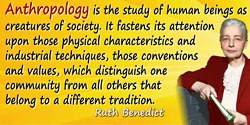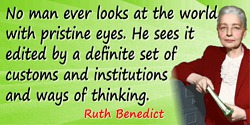 (source)
(source)
|
Ruth Benedict
(5 Jun 1887 - 17 Sep 1948)
American anthropologist known as an expert on several American Indian tribes that she studied.
|
Science Quotes by Ruth Benedict (18 quotes)
[Very doubtful attribution.] The purpose of anthropology is to make the world safe for human differences.
— Ruth Benedict
This likely misquote is included here to caution: do NOT blindly accept it. Webmaster has so far been unable to find any primary source for this viral alleged quote. It is often seen, but never with a citation. Or worse, with a citation to another source which fails to give a citation at all. ApostateAbe, 'Stop this Ruth Benedict misquote', Reddit (c.Dec 2017) directly challenges the quote: “Ruth Benedict never said it, not in any of her published writings. It seems to be merely myth. It is never specifically cited, nor does it make historical sense.” So, if you know an authentic primary source, please contact Webmaster.
A man’s indebtedness … is not virtue; his repayment is. Virtue begins when he dedicates himself actively to the job of gratitude.
— Ruth Benedict
In The Chrysanthemum and the Sword (1946, 2006), 114.
Anthropology is the study of human beings as creatures of society. It fastens its attention upon those physical characteristics and industrial techniques, those conventions and values, which distinguish one community from all others that belong to a different tradition.
— Ruth Benedict
In 'The Science of Custom', Patterns of Culture (1934, 2005), 1.
Culture is not a biologically transmitted complex.
— Ruth Benedict
In 'The Science of Custom', Patterns of Culture (1934, 2005), 14.
I gambled on having the strength to live two lives, one for myself and one for the world.
— Ruth Benedict
Journal entry (in her late 30s), as quoted in Margaret Mead, 'Search: 1920-1930', An Anthropologist at Work (1959, 2011), 3.
I have always used the world of make-believe with a certain desperation.
— Ruth Benedict
In An Anthropologist at Work (1959, 2011), 140.
I haven’t strength of mind not to need a career.
— Ruth Benedict
As quoted by Margaret Mead (who was a student of Benedict), in 'Search: 1920-1930', Ruth Benedict, An Anthropologist at Work (1959, 2011), 3.
I long to speak out the intense inspiration that comes to me from the lives of strong women. They have made of their lives a great adventure.
— Ruth Benedict
In a Journal Fragment (Jan 1917), collected in Margaret Mead, An Anthropologist at Work: Writings of Ruth Benedict (1959, 1966), 140.
If we justify war, it is because all peoples always justify the traits of which they find themselves possessed, not because war will bear an objective examination of its merits.
— Ruth Benedict
In 'The Diversity of Cultures', Patterns of Culture (1934, 2005), 31.
No man ever looks at the world with pristine eyes. He sees it edited by a definite set of customs and institutions and ways of thinking.
— Ruth Benedict
In 'The Science of Custom', Patterns of Culture (1934, 2005), 2.
Our faith in the present dies out long before our faith in the future.
— Ruth Benedict
In An Anthropologist at Work (1959, 2011), 125.
Racism is an ism to which everyone in the world today is exposed; for or against, we must take sides. And the history of the future will differ according to the decision which we make.
— Ruth Benedict
In Race: Science and Politics (1945), 5.
The adequate study of culture, our own and those on the opposite side of the globe, can press on to fulfillment only as we learn today from the humanities as well as from the sciences.
— Ruth Benedict
In An Anthropologist at Work (1959, 2011), 470.
The Japanese are, to the highest degree, both aggressive and unaggressive, both militaristic and aesthetic, both insolent and polite, rigid and adaptable, submissive and resentful of being pushed around, loyal and treacherous, brave and timid, conservative and hospitable to new ways.
— Ruth Benedict
In The Chrysanthemum and the Sword: Patterns of Japanese Culture (1946, 2006), 2.
The life history of the individual is first and foremost an accommodation to the patterns and standards traditionally handed down in his community. From the moment of birth the customs into which he is born shape his experience and behavior.
— Ruth Benedict
In 'The Science of Custom', Patterns of Culture (1934, 2005), 2-3.
The trouble is not that we are never happy—it is that happiness is so episodical. … I cannot see what holds it together.
— Ruth Benedict
In An Anthropologist at Work (1959, 2011), 121.
The trouble with life isn’t that there is no answer, it’s that there are so many answers.
— Ruth Benedict
Journal entry, as a young woman, as quoted in Margaret Mead, Ruth Benedict: A Humanist in Anthropology (1974), 2.
We grow in time to trust the future for our answers.
— Ruth Benedict
In An Anthropologist at Work (1959, 2011), 134.
See also:
- 5 Jun - short biography, births, deaths and events on date of Benedict's birth.
- An Anthropologist at Work, by Ruth Benedict. - book suggestion.









 In science it often happens that scientists say, 'You know that's a really good argument; my position is mistaken,' and then they would actually change their minds and you never hear that old view from them again. They really do it. It doesn't happen as often as it should, because scientists are human and change is sometimes painful. But it happens every day. I cannot recall the last time something like that happened in politics or religion.
(1987) --
In science it often happens that scientists say, 'You know that's a really good argument; my position is mistaken,' and then they would actually change their minds and you never hear that old view from them again. They really do it. It doesn't happen as often as it should, because scientists are human and change is sometimes painful. But it happens every day. I cannot recall the last time something like that happened in politics or religion.
(1987) -- 


